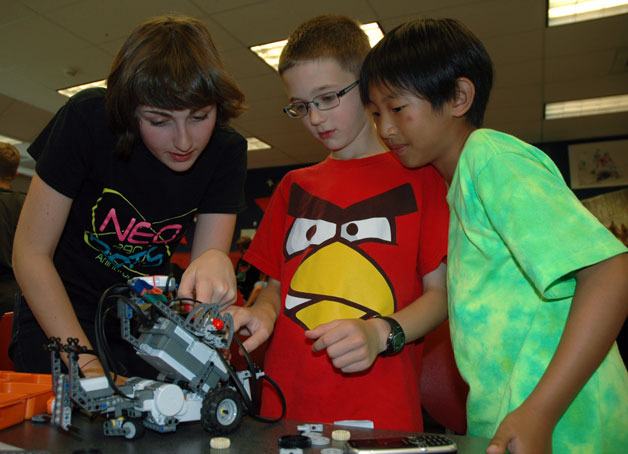ARLINGTON — School was out for summer, but that didn’t stop students from teaching other students from July 18-20 in the computer-aided design and wood-shop building behind Arlington High School.
Four students and 11 student mentors from the AHS NeoBots Team worked with 39 students from all the elementary and middle schools in the Arlington School District, plus one student from Marysville and another from Sedro-Woolley, to teach them the essentials of robotics, and to promote science, technology, engineering and math topics in the process.
AHS Career and Technical Education Director Brett Sarver explained that an elementary school teacher whose son is on the NeoBots Team suggested it as a means of getting other elementary and middle school students into STEM topics.
During those three days, students such as lead instructor and AHS NeoBots Team President Dan Radion explained to the elementary and middle school students how to write programs for their robots, before the student mentors took those kids’ robots out for test drives on simple obstacle courses after they’d been programmed.
“A robot is only as smart as the person who wrote its programs,” Radion said. “They can do a lot of really cool stuff, but they won’t know how to do it until you tell them.”
Radion taught the elementary and middle school students the basic language of programming, and guided them through the applied mechanics of making a robot move in certain directions by programming each of its wheels to move at certain speeds and in certain directions.
“I tried to use as many everyday examples as I could when I was explaining the programming concepts,” said Radion, who employed the analogy of assembling a peanut butter and jelly sandwich to convey how many assumptions we make when we give and receive instructions to our fellow humans, when robots cannot make such assumptions.
Zach Rodriguez served as one of the student mentors, and tried to let his pupils learn from making mistakes, by only supplying them with helpful hints after they’d performed their experiments.
“The most rewarding part was seeing the kids program the robot without my assistance, and then have it successfully complete the challenges,” Rodriguez said.
Unlike Rodriguez, who admitted that serving as a mentor pushed him outside of his comfort zone, fellow student mentor Caroline Vogl had already developed confidence in instructing children by teaching Taekwondo to kids aged 3-5.
“I knew that I’d have to be patient, help them with their problems and deal with them getting hyper,” Vogl said. “When showing them what to do, you just need to go slow if they’re not getting it, or step back if they don’t need you right then.”
Rodriguez and Radion agreed with Sarver’s assessment of how quickly the elementary and middle school students caught on after their initial trial-and-error period.
“These students are sharp,” Sarver said. “They did very well with the robotic scenarios and with understanding programming and robot problem solving.”
“Despite the months of tiring work planning and setting up this event, it was very rewarding to see the kids so excited about building and programming robots,” Radion said. “Most of the kids at the camp have never done programming before this camp, yet they still learned very quickly.”
“I was really impressed with some of the ideas the students came up with,” Rodriguez said. “They completed the challenges in some very interesting ways.”
Rodriguez expressed pride in his newfound ability to teach others, while Vogl echoed the positive feedback that she, her student mentor peers and Sarver had all received from the elementary and middle school students.
“There’s going to be a next time,” said Vogl, who noted that discussions have already begun about scheduling more robotics day camps. “We’re teaching kids skills related to technology, such as building and programming, and life skills, such as teamwork and ingenuity. This program also helps the NeoBots Team get publicity throughout the community, and gain possible new recruits for the future.”
“With the projected shortage of a skilled labor force in the very near future, it is important that students are provided with the opportunity to learn STEM topics through applied, hands-on learning opportunities,” Sarver said. “If you build it, they will come. Arlington is taking a strong educational leadership role within Snohomish County to provide students with STEM educational opportunities, to better understand how and why things work.”







